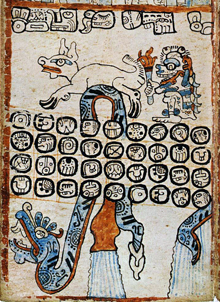Symposium to Explore Maya Calendar and Creation
If you're curious about the intricacies of ancient Maya calendars and the relevance of December 2012, the Sixth Annual Tulane Maya Symposium and Teacher Workshop on “Maya Calendars and Creation” is for you.

Astronomical symbolism and possibly an eclipse table are part of the Madrid Codex, one of the ancient Maya glyph books. (Courtesy of the Museo de America, Madrid)
Through a series of lectures, workshops and a roundtable discussion, specialists at the symposium will discuss the final baktun or cycle of the current era of the Maya long-count calendar, within the worldview of the ancient and contemporary Maya.
The symposium and workshop series will be presented on Feb. 6â“8 by Tulane University's Stone Center for Latin American Studies and the Middle American Research Institute.
The symposium will explore the current understanding of the intricacies of Maya calendars and the relevance of the upcoming completion of the final baktun of the current era. On Dec. 21, 2012, the Maya long-count calendar ends after more than 5,000 years.
Among the topics to be considered at the workshop are divinatory almanacs and references to Maya creation mythology in the texts and iconography of pre-Columbian codices and the Colonial Books of Chilam Balam. Discussions will center on the role of creation stories and foundation events in Classic, Postclassic and contemporary Maya rituals.
“With guest speakers from the fields of archaeology, art history, epigraphy, ethnohistory, linguistics and archaeoastronomy, the symposium promises to be a memorable weekend spent exploring and discussing Maya creation mythology, divination and prophecy, and calendar systems,” says Denise Woltering, program manager for educational programs at the Stone Center.
On Feb. 6 the symposium also will include a feature-length, action film, Eréndira Ikikunari. Shot entirely in the original Purépecha language, the film recreates the 16th-century legend of Eréndira, a young Purépecha woman who became an icon of bravery during the destruction of indigenous Mexico by the Spanish conquistadors. When the Spanish arrive, they take advantage of the discord and conflict among the locals, reaping the benefits of a region divided. On the verge of marriage, Eréndira refuses to allow her land to be destroyed and stands up to the social conventions prohibiting women to participate in battle. In the face of the invasion, she steals and learns to ride a horse against the Spanish, winning the respect of her tribal leaders. Along her journey, she becomes a symbol of strength and resistance within her culture.
Early registration fees for the weekend have been extended until Jan. 21. Fees are $75 for regular participants, $45 for educators and $25 for students. Curriculum resources that teachers can take into their classrooms will be distributed at the workshop.
For more information on the Maya Symposium and Workshop, contact Denise Woltering at the Stone Center for Latin American Studies at 504-862-3143.
